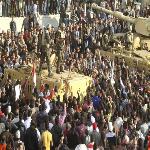March 30, 2011

Photo: AP
Armed soldiers look down on protesters surrounding military vehicles in Tahrir Square in Cairo, Egypt, February 2, 2011
Egyptian activists have called for a protest Friday against torture, which they say continues under the nation's new army leadership. The call comes as the army pledges to help Egypt transition to the rule of law, beginning with an amended constitution.
The anti-torture rally will take place on Tahrir Square where democracy protesters have continued to rally, but not without a price.
On March 9, the army arrested a group of nearly 200 demonstrators. According to human rights groups and some of the 20 women rounded up, they were taken to the nearby Egyptian Museum where they were beaten and subjected to electric shocks. The group was later moved to a military camp. Heba Morayef, of Human Rights Watch, describes what happened next.
"The next morning a military officer came to them and asked them which of them were virgins and which were not," she said. "They then separated into two different groups and then the seven women who identified themselves as unmarried were subjected to forced virginity tests."
Morayef points out previous examples of military abuse, but calls this an extreme case. "What occurred was very, very serious in terms of abuses specifically to the women because forced virginity tests amounts sexual assault. But more broadly also, because of the torture cases of which there are dozens of cases also among the male detainees," she said.
Many here have high hopes for the "New Egypt" but such reports bring back some of the worst memories of the former era - arbitrary arrests, secret detentions, and most hauntingly - torture.

AP
An activist carries a picture of slain Khaled Said with Arabic that reads "Why was Khaled killed?" during a protest at the Egyptian Journalists Syndicate in Cairo, June 19, 2010Among the many events that played into the Egyptian uprising was the death last year of Khaled Said, a young Alexandria man, dragged out of a cafe and brutally beaten in public, allegedly by plainclothes police.
'Continuing trend'
While some, like human rights worker Morayef worry the events of March 9 and 10 may be part of a continuing trend, others, even long time government critics, are not so sure.
Hesham Kassem is an independent publisher, "I have no doubt that this was basically an officer who decided to act on the spot and there came a clear declaration that there will be an investigation in the allegations," he said.
An announcement this week by the army that an investigation will be forthcoming has been welcomed by many. But some noted that it was followed by a warning to youths not to spread rumors that tarnish the image of "honorable figures." Others, like Morayef, wonder if the promise of an inquiry is enough.
"I think it is too early to judge. I think the commitment to investigate is a very important one and unprecedented because so far the complaints about torture have been met with denials by the military. So this is an important shift. What we are now very keen to ensure is that the investigation is an independent one," said Morayef.
The army has promised to simply lead the country to civilian rule, starting with the adoption of an amended constitution that paves the way for the election of a new parliament, president and, eventually, a new constitution.
Emergency law
But the much anticipated rule of law remains, at least for now, elusive. Emergency law, which has allowed for countless abuses over the decades, remains in place. And the army's attempts to downplay it have been less than reassuring.
Military Council member General Mamdouh Shahin said this week that "emergency law is merely a title."
The point of rule of law, of course, is that nothing surpasses it.
Publisher and long time dissident Kassem says in some ways, that's fine. The army, he says, should not be the one making the legal and political changes that will determine Egypt's future. "Once we talk about a civilian government being voted in, I have no doubt that in the future such practices will not be tolerated," said Kassem.
Many here feel the army is eager to return to its role behind the scenes and let a democratically-elected government take charge. Back in the barracks, the military can bask in the general goodwill of the populace, something running the day-to-day affairs of the country threatens to jeopardize.
But that still leaves the interim, and the concerns of people like rights worker Morayef. "This needs to be taken extremely seriously, both by the civil society and the media, but also by the military to ensure that it does not occur once again, since the military will remain deployed in the streets over the major cities of Egypt for many more months to come," said Morayef.
She says the need for the military to look deeply at its inner workings is something other key parts of the security apparatus must do, too, especially the Interior Ministry.
It's a point activists hope to convey during their anti-torture rally. And it's something many promise to continue to push for. As others have noted, Tahrir Square, symbol of people's power whatever the risks, is still there.